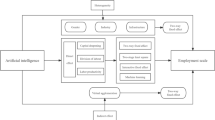Abstract
In this paper, the model which will be analysed is characterized by a labour market with (a) profitable vacancies, (b) unemployment, (c) excess labour supply, (d) limited mobility and divisibility of labour, and (e) competition on-the-job. The analysed setting is typical for a small-business economy. The analysis suggests that unemployment will be greater than equilibrium unemployment if present employees and potential entrants consider job assignments for this market under strategic perspectives.
Similar content being viewed by others
References
Baumol, William J., 1982, ‘Contestable Markets: An Uprising in the Theory of Industry Structure’,American Economic Review 72, 1–15.
Bernheim, B. Douglas, 1984, ‘Rationalizable Strategic Behavior’,Econometrica 52, 1007–1028.
Bull, Clive, 1983, ‘Implicit Contracts in the Absence of Enforcement and Risk Aversion’,American Economic Review73, 658–671.
Demsetz, Harold, 1982, ‘Barriers to Entry’,American Economic Review 72, 47–57.
Driehuis, W., 1978, ‘Labour Market Imbalances and Structural Unemployment’,Kyklos 31, 636–661.
Hamermesh, Daniel S. and Albert Rees, 1984,The Economics of Work and Pay, 3rd edn., New York et al.: Harper and Row.
Harsanyi, John C., 1977,Rational Behavior and Bargaining Equilibrium in Games and Social Situations, Cambridge: Cambridge University Press.
Holler, Manfred J., 1986, ‘Moral Sentiments and Self-Interest Reconsidered’, in A. Diekmann and P. Mitter (eds.),Paradoxical Effects of Social Behavior. Essays in Honor of Anatol Rapoport, Heidelberg and Vienna: Physica-Verlag.
Holler, Manfred J., 1990, ‘The Unprofitability of Mixed-Strategy Equilibria in Two-Person Games: A Second Folk-Theorem’,Economics Letters 32, 319–323.
Holler, M. J. and V. Høst, 1990, ‘Maximim vs. Nash Equilibrium: Theoretical Results and Empirical Evidence’, in R. E. Quandt and D. Triska (eds.),Optimal Decisions in Markets and Planned Economies, Boulder, San Francisco and London: Westview.
Holt, Charles, 1970, ‘How Can the Philips Curve Be Moved to Reduce Both Inflation and Unemployment?’, in E. S. Phelps et al. (eds.),Microeconomic Foundations of Employment and Inflation Theory, New York: Norton.
Milgrom, Paul and John Roberts, 1982, ‘Limiting Pricing and Entry under Incomplete Information: An Equilibrium Analysis’,Econometrica 50, 443–459.
Morgenstern, Oskar and Gerhard Schwödiauer, 1976, ‘Competition and Collusion in Bilateral Markets’,Zeitschrift für Nationalökonomie 36, 217–247.
Pearce, David G., 1984, ‘Rationalizable Strategic Behavior and the Problem of Perfection’,Econometrica 52, 1029–1050.
Sherman, Roger and Thomas D. Willett, 1967, ‘Potential Entrants Discourage Entry’,Journal of Political Economy 75, 400–403.
Tsebelis, George, 1989, ‘The Abuse of Probability in Political Analysis: The Robinson Crusoe Fallacy’,American Political Science Review 83, 77–82.
von Neumann, John and Oskar Morgenstern, 1947,Theory of Games and Economic Behavior, 2nd ed., Princeton: Princeton University Press.
Wittman, Donald, 1985, Counter-Intuitive Results in Game Theory,European Journal of Political Economy 1, 77–89.
Author information
Authors and Affiliations
Rights and permissions
About this article
Cite this article
Holler, M.J. Supply-side strategic unemployment in small business. Small Bus Econ 5, 221–228 (1993). https://doi.org/10.1007/BF01531919
Accepted:
Issue Date:
DOI: https://doi.org/10.1007/BF01531919




